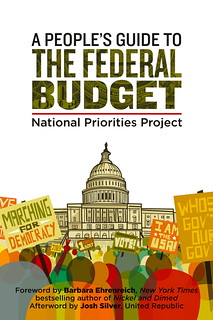Money Don't Talk...
By
Guest Blogger
Posted:
|
Budget Process
Bob Dylan once said, "Money don't talk, it swears!" While it's easy to curse the budgetary decisions made by lawmakers, we often don’t realize how incredibly complicated the process is.

I've been reading A People's Guide to the Federal Budget, and though we as Americans may disagree with lawmakers about decisions made in the federal budget process, A People's Guide explains how lawmakers and the president work together through a process of checks and balances. And the book points out lots of opportunity for regular people to get in touch with lawmakers to make our voices heard.
The Constitution doesn't lay out a process for creating the federal budget, but it does influence the way lawmakers and the executive branch work together to ensure a balance in power. Therefore, finalizing the federal budget requires many steps: The president submits a budget request, the House and Senate pass budget resolutions, review and suggest adjustments through subcommittee work, make compromises and send the budget back to the president for approval. As you can see, it requires cooperation and concessions.
And I've learned that the budget grows and shrinks as we enter and leave wartime and as the economy swings through recession and boom times, for example. These factors also influence prevailing economic theory and ideology about the best way for lawmakers to keep the economy strong. And while shifting theories drive the ever-changing budget, the process of creating and approving the budget will always be lengthy, with input from hundreds of lawmakers representing millions of constituents. In order for you and I to have a voice in the way our government spends our money, we need to dig into A People's Guide and get familiar with how this process works.

Check out the book here.
Maria Millard is the House Democratic Campaign Committee Midcoast Director.